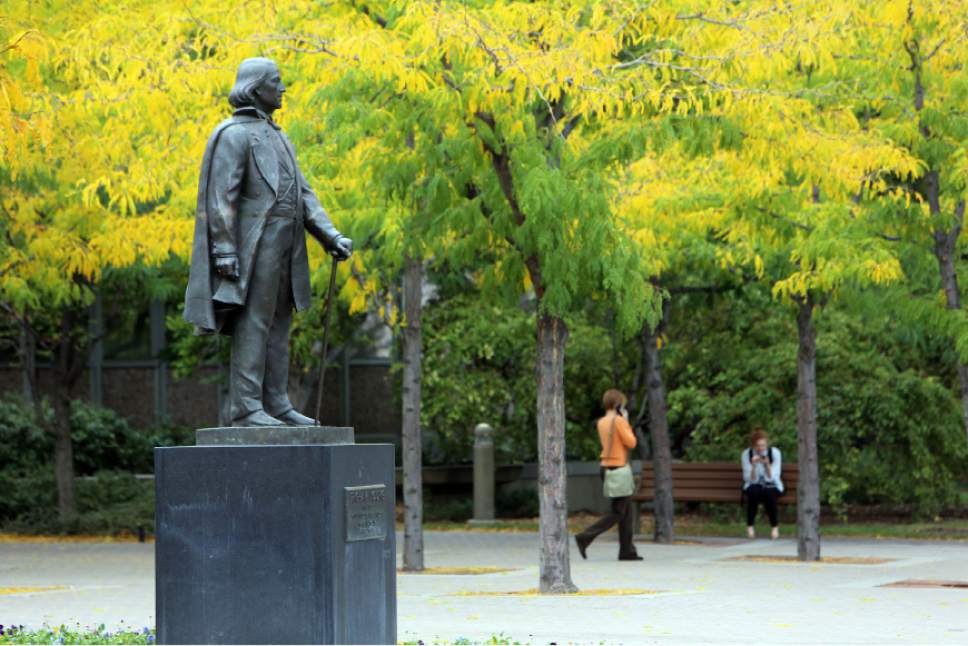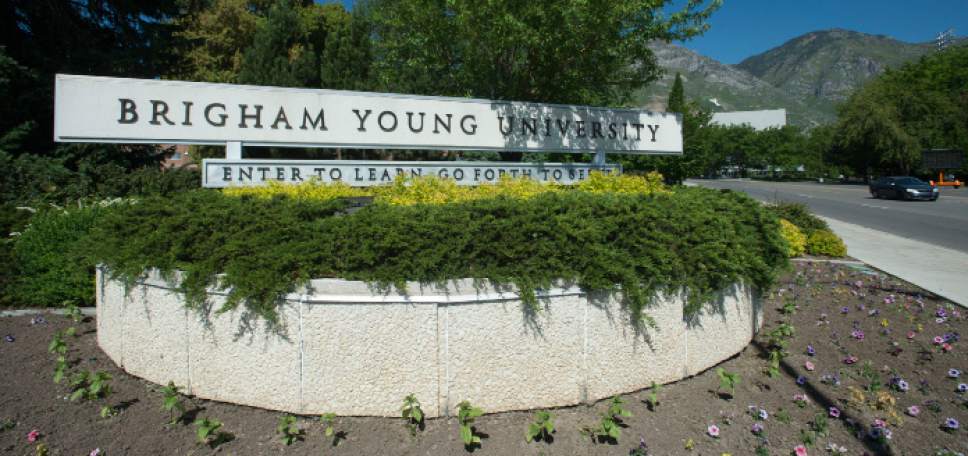This is an archived article that was published on sltrib.com in 2017, and information in the article may be outdated. It is provided only for personal research purposes and may not be reprinted.
How has your mental health been affected as an LGBTQ student?
On a college campus in 2017, the question might not raise many eyebrows.
But that it was asked during a public forum on the campus of LDS Church-owned Brigham Young University?
"Huge … historic," Addison Jenkins said.
Jenkins was one of four student panelists asked the question as part of the LGBTQ Mental Health Forum on April 7 in the Wilkinson Student Center.
The event was the first campuswide, school-sanctioned event held specifically to discuss the challenges and experiences of LGBTQ students.
"It's such a big deal," said Dillon Harker, a gay student who sent The Salt Lake Tribune an audio recording of the event. "I see it as a big step forward and the beginning of a conversation."
Like its owner-operator, The Church of Jesus Christ of Latter-day Saints, BYU historically has had a rocky relationship with the gay community. Mormon teachings condemn homosexual sex as a sin and BYU's Honor Code forbids all expressions of gay behavior and intimacy.
That has left many students feeling uneasy about their place on the Provo campus of more than 33,000.
"You're very disempowered when you're queer," said Harker, who noted that after nearly a decade of trying to fit in, he is transferring to the University of Utah to finish his engineering degree. "So to see LGBT students officially recognized as even existing is huge."
It isn't just students who are pleased.
BYU Counseling Center Director Steven Smith served as the panel's moderator and said that after 25 years of working with students — many of whom identified as gay or lesbian — he believes it is important to raise awareness of the LGBTQ student population. That the school's administration sanctioned the forum also sends an important message to LGBTQ students.
The event says "you have a place here. I think it says you are important to us," said Smith, a psychologist. "I think it says we want to hear from you and about your experience."
The event was driven by the campus-based club for the National Alliance on Mental Illness (NAMI), he added, and was easily approved by higher-ups.
The panel featured students who identify as gay, lesbian and nonbinary, meaning that the individual has a gender identity that lies somewhere between male and female.
Some questions were generated in advance; others came from the audience, which nearly filled the Varsity Theater.
The hourlong discussion was honest, sometimes humorous and powerfully emotional, Smith said. The panelists shared their struggles with depression and loneliness, the acceptance or rejection they have felt from family, the need for campus-based resources and ways in which straight students could be more welcoming.
"I thought they were really brave folks to get up and talk about their struggles," he said. "I got teary more than once."
Jenkins, who is gay and the outgoing president of the off-campus Understanding Same-Gender Attraction group, said he grew emotional when he looked out at the audience and realized how the discussion might offer a lifeline to someone still grappling with sexual identity.
In 2012, Jenkins said, he went with friends to a discussion of LGBTQ issues organized by professors for sociology and psychology students. The event, which wasn't school-sanctioned and drew complaints from anti-gay activists, spurred then-still-in-the-closet Jenkins to come out, he said.
"So in the moment, as I'm sitting on the panel, I realize that what happened five years ago, was monumental for me," he said. "The reverberations from this event will hopefully do a lot of good."
Smith shares Jenkins' hopes and said that for struggling LGBTQ students, finding a role model or someone with whom they can identify is critically important.
"That is one of the most psychologically relieving things there is," he said, "whether you are at BYU or the U. of U. or wherever you are."
Psychology student Kate Hargadon, a self-described straight, believing Latter-day Saint, said she came away from the forum with more empathy for her fellow students.
"It made me want to encourage my friends to speak their truths," she said, "and to help make more safe spaces for people."
Hargadon, who is affiliated with NAMI, said that, by sanctioning the forum, BYU's administration may be signaling the population of straight students that being an ally of the LGBTQ community is OK.
"There is a big part of this [LGBTQ] story that relates to how things have been not so great," Hargadon said. "But I think something I did see here is that if we seek for it and allow for it, there is love here and there is community and that we can all contribute to that."





